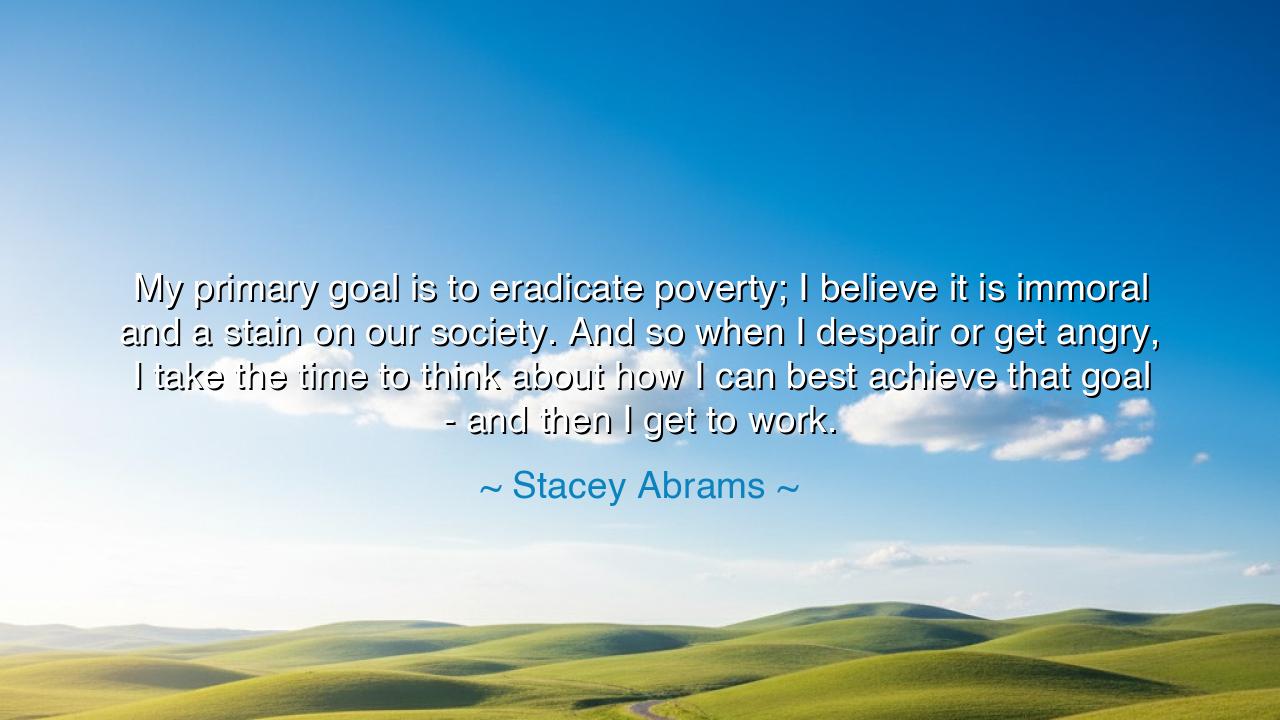
My primary goal is to eradicate poverty; I believe it is immoral
My primary goal is to eradicate poverty; I believe it is immoral and a stain on our society. And so when I despair or get angry, I take the time to think about how I can best achieve that goal - and then I get to work.






Hear now the words of Stacey Abrams, carved with fire upon the heart of justice: “My primary goal is to eradicate poverty; I believe it is immoral and a stain on our society. And so when I despair or get angry, I take the time to think about how I can best achieve that goal—and then I get to work.” This is no ordinary declaration, but a vow, a covenant with the downtrodden, a call to arms against the cruelest enemy of mankind—poverty. For poverty is not merely the lack of bread, nor the emptiness of the purse, but the theft of dignity, the silencing of dreams, and the smothering of hope. To accept it is to accept injustice; to fight it is to walk the path of righteousness.
From the dawn of civilizations, wise rulers and prophets alike have known that a society is only as strong as its weakest member. When the poor are abandoned, when their cries go unheard, the whole of the nation rots from within. Yet when they are lifted, when their burdens are lightened, the community flourishes like a garden after rain. Abrams, echoing this eternal wisdom, names poverty not simply as an obstacle, but as immoral, a stain upon society. She places it not in the realm of economics alone, but in the realm of morality, where it belongs.
History itself testifies to the power of this vision. Consider Franklin D. Roosevelt, who, in the shadows of the Great Depression, declared that the test of a nation’s progress is not whether it adds to the abundance of those who have much, but whether it provides enough for those who have little. Through the New Deal, programs were built not only to restore the economy but to restore human dignity. His work did not erase all suffering, but it gave the poor strength and the nation hope. In the same spirit, Abrams calls upon her generation to see poverty as a moral wound that demands healing through action.
But there is deeper wisdom still in her words. For she does not deny the weariness of the fight, nor the storms of despair and anger that beset every warrior of justice. She admits to them openly, as all great souls must. Yet she teaches that these emotions must not consume us, but be transformed into fuel. When despair threatens, she pauses. When anger burns, she reflects. And then, she acts. For true greatness is not to be free of weakness, but to turn weakness into strength, and rage into resolve.
The power of her teaching lies in its simplicity: she does not lose herself in endless lamentation, nor surrender to bitterness. She returns always to her goal, her unwavering purpose. By setting her eyes on the eradication of poverty, she gains clarity. By reminding herself of the suffering she seeks to end, she finds courage. And by stepping forward into action, however small or large, she keeps despair from winning. This rhythm of reflection and labor, of anger transmuted into action, is the discipline of those who change the world.
What lesson, then, shall we take from Abrams’ vow? It is this: when confronted with injustice, do not let sorrow paralyze you, nor rage consume you. Fix your mind upon the higher goal—whether it be justice, compassion, or the lifting of the oppressed. Transform your emotions into tools, your despair into determination, your anger into focused effort. The stain of poverty may be vast, but so too is the power of persistent hands and unyielding hearts.
And what actions shall you take? Begin where you are. Give, where you can. Support leaders who fight for justice. Offer your skills to those who lack them, your time to those who need it, your voice to those silenced. Do not wait for others to act; let your own life become a strike against poverty. For as Abrams teaches, the work may be long, but each act carries the weight of eternity.
Thus let it be remembered: poverty is not fate, it is not natural—it is a stain. And stains, though dark and stubborn, can be cleansed when many hands labor together. Let your heart burn with compassion, let your anger sharpen into resolve, and let your despair be transformed into action. In this way, each of us may join the sacred struggle, until the day when no child hungers, no soul is forgotten, and the stain is erased from the fabric of humanity.






AAdministratorAdministrator
Welcome, honored guests. Please leave a comment, we will respond soon